Canada’s Oldest Chinatown

Victoria, British Columbia is home to Canada’s oldest Chinatown
Victoria, British Columbia is home to Canada’s oldest Chinatown and the second oldest in North America, after San Francisco. Today, this area north of downtown remains a colourful, lively place full of Chinese history and culture. It is also home to heritage buildings, trendy restaurants, and unique shops.
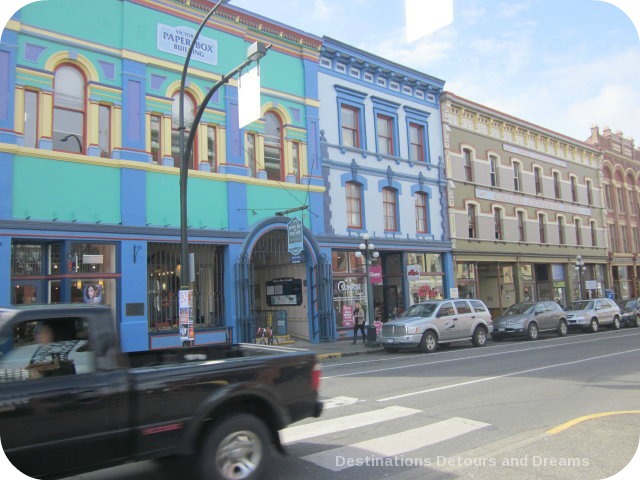
Victoria was once the major port of entry for Asians into British North America. In the 1850s and 1860s, several thousand Chinese gold miners entered on their way to the Fraser River and the Cariboo. In the 1880s, about 15,000 Chinese came to help build the Canadian Pacific Railway. The Chinese named Victoria Dai Fao, which means “big port.”
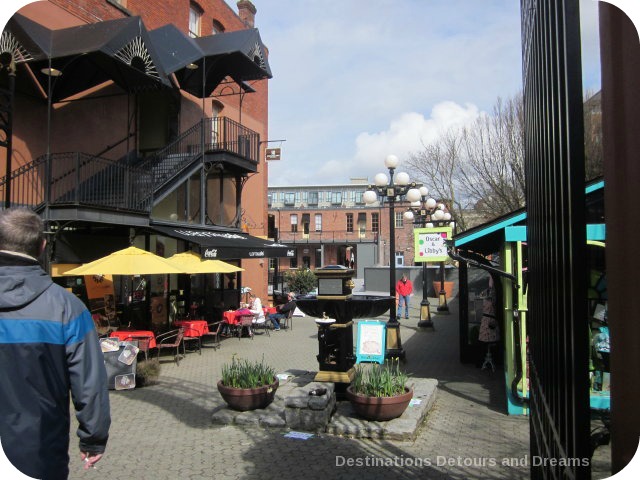
The first Chinese in Victoria, mostly young men hoping to make it rich and return to China, settled in an area north of a ravine and stream which ran through what is now Market Square. It was away from the centre of town and cheaper. Over the following years Chinatown became home for many Chinese who travelled seasonally for gold mining, salmon canning, and logging.
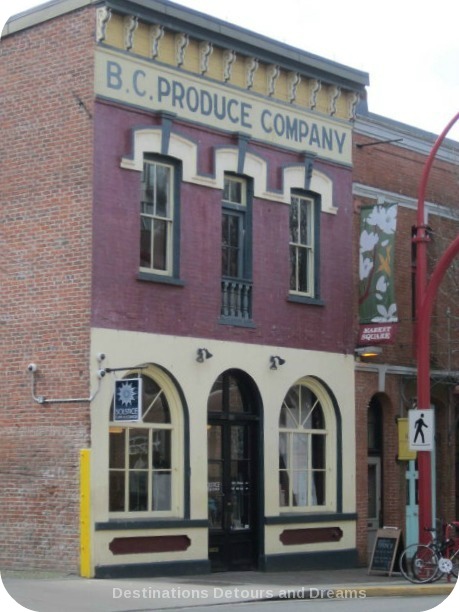
The original buildings on Pandora Avenue, on one side of Market Square, were flimsy and made of wood. In the 1880s, they were replaced with the present day brick structures. The Tye Chong Building, also known as the B.C. Produce Company Building, was built by Tye Chong in the Italianate style on land owned by Carlo Bossi. Chinese merchants adopted prevailing architectural styles for their storefronts. The main floor housed a grocer. There was a Chinese restaurant on the second floor. For many years, this building supplied vegetables and fruit to stores around town. Many of the early Chinese were from farming areas in the Guangdong Province. They planted garden plots and sold produce door to door.
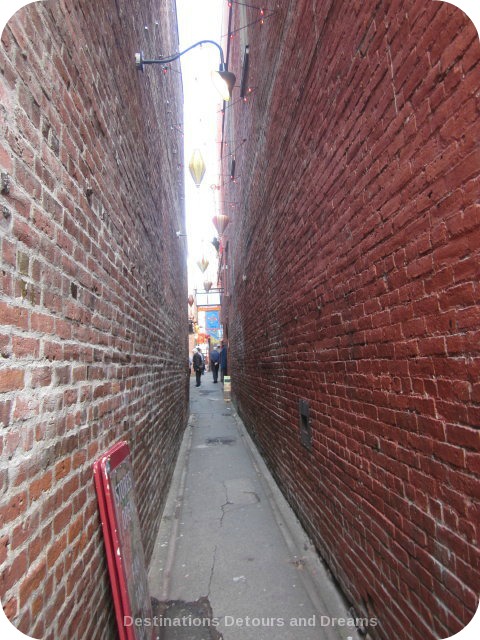
Fan Tan Alley is Canada’s narrowest street. Fan tan is a gambling game that was popular in the 1880s. It was played in six gambling dens in rooms upstairs in the Alley. Ground-floor storefronts housed opium dens, restaurants, shops, and a tofu factory. Opium was legal in Canada until 1908, but gambling was not. In order to slow down police during raids, gates were locked at each end of the Alley and there were trap doors to second floors. The gambling dens earned Chinatown the nickname “Victoria’s Forbidden City.” Today, the Alley contains shops.
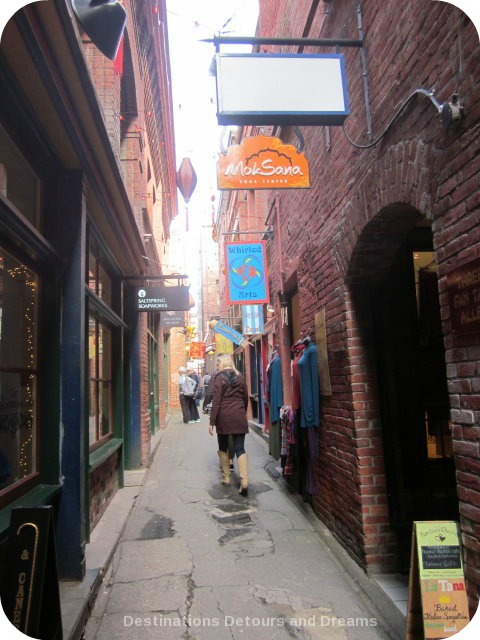
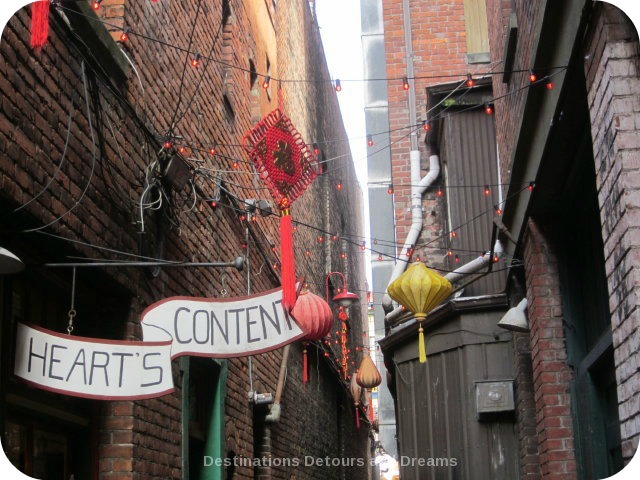
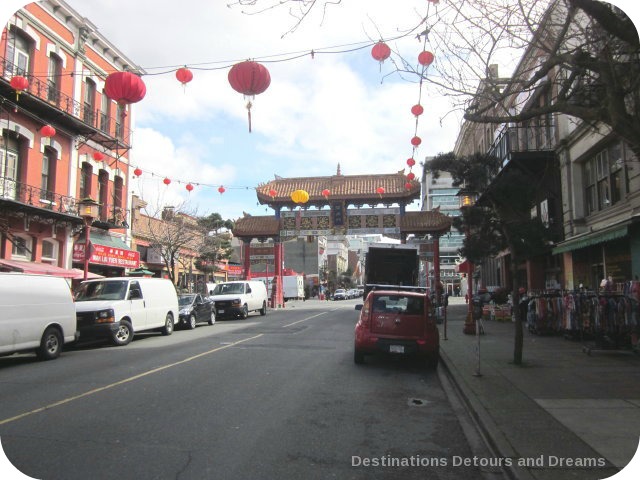
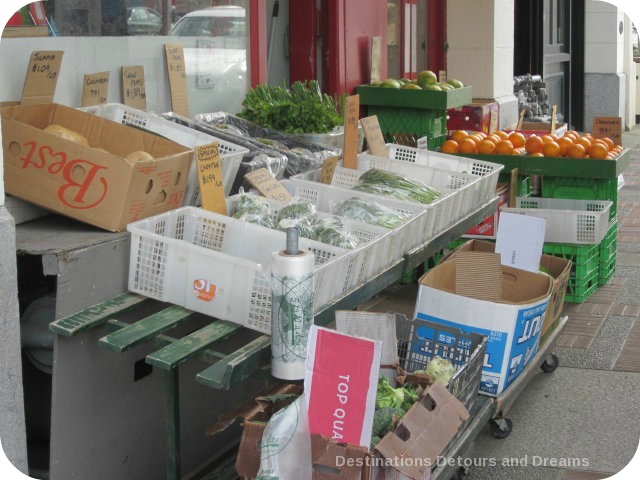
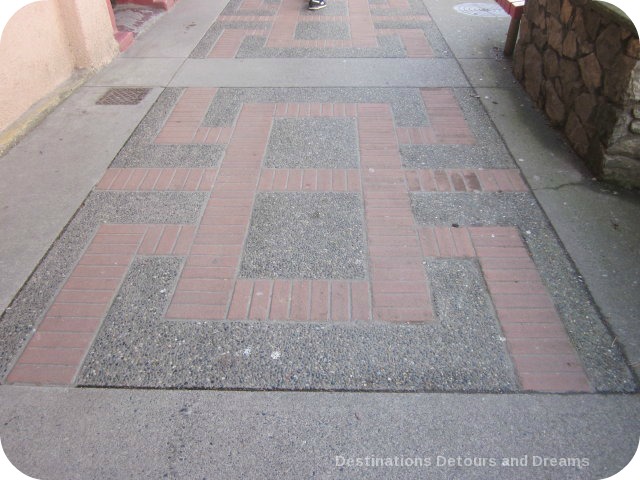
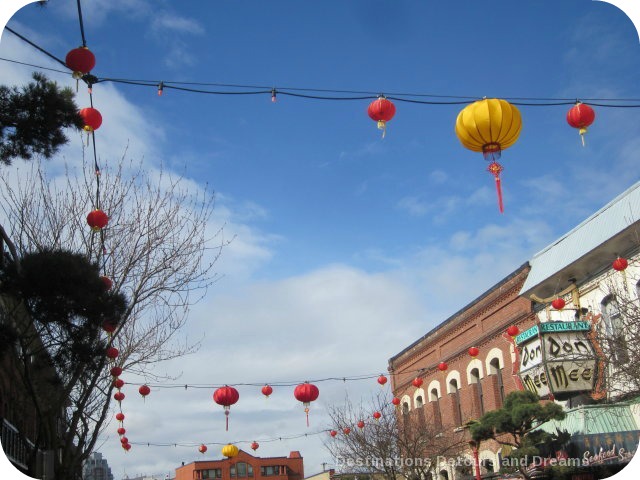
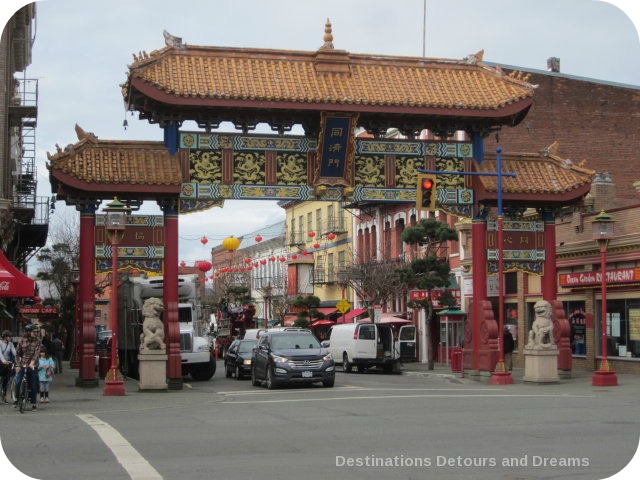
The Gate of Harmonious Interest at the corner of Fisgard and Government was built in 1981 following the Chinese tradition of erecting gates to commemorate important places or events.
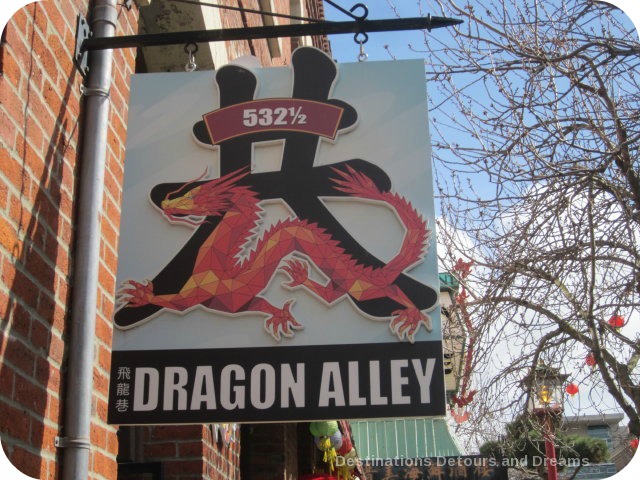
Dragon Alley, another narrow passageway, was once the entrance to very crowded residences for men. The dragon is a symbol of good luck and positive energy.
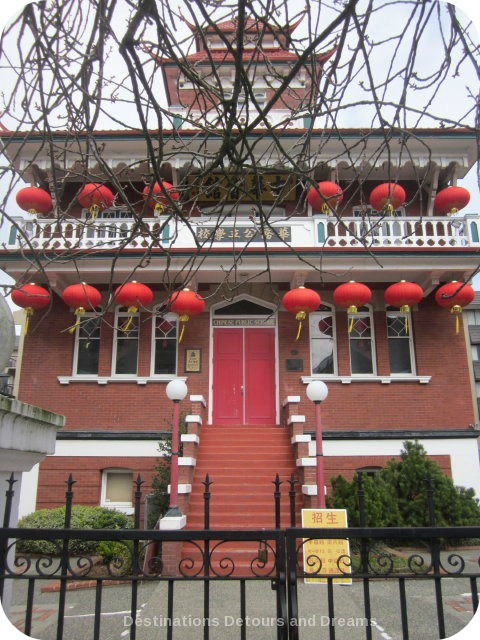
Chinese children were once banned from attending public schools unless they spoke English. In 1909, the Chinese community established the Chinese Public School where immigrants could learn the English language. Today it serves as a cultural centre and a place where children are taught the Chinese language and culture.
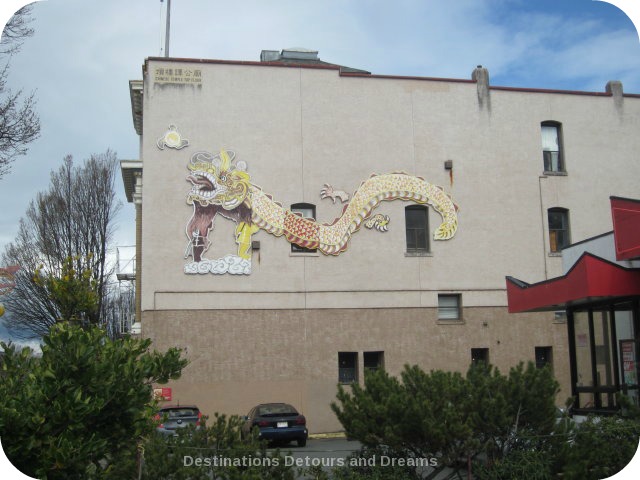
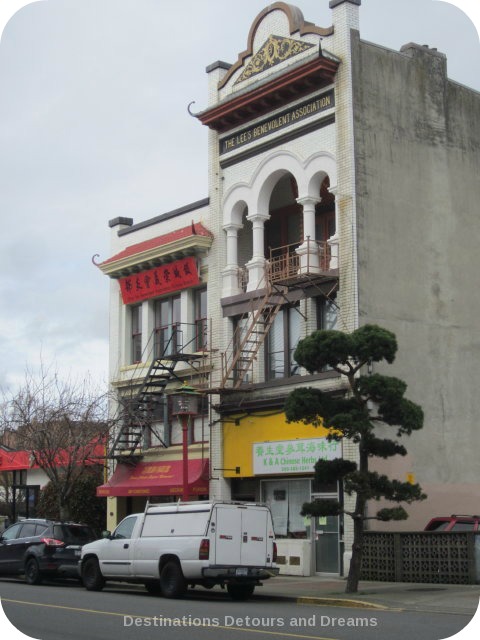
Chinatown is a several block area which can easily be explored on foot. It starts just north of Johnston Street, a few blocks north of downtown, and runs between Shore Street and Douglas Street. Discover the Past offers guided walking tours of Chinatown. Or you can do what I did and take a self-guided tour with the aid of this Mysterious Chinatown Self-Guided Heritage Walking Map. You can explore history, browse shops, sip coffee or tea, and dine. There are several Chinese restaurants, of course. This area is also home to other popular Victoria cafés.
If you enjoyed this post, sign up for Destinations Detours and Dreams monthly e-newsletter. Get behind the scenes information and sneak peeks ahead in addition to a recap of the month’s posts.
PIN IT
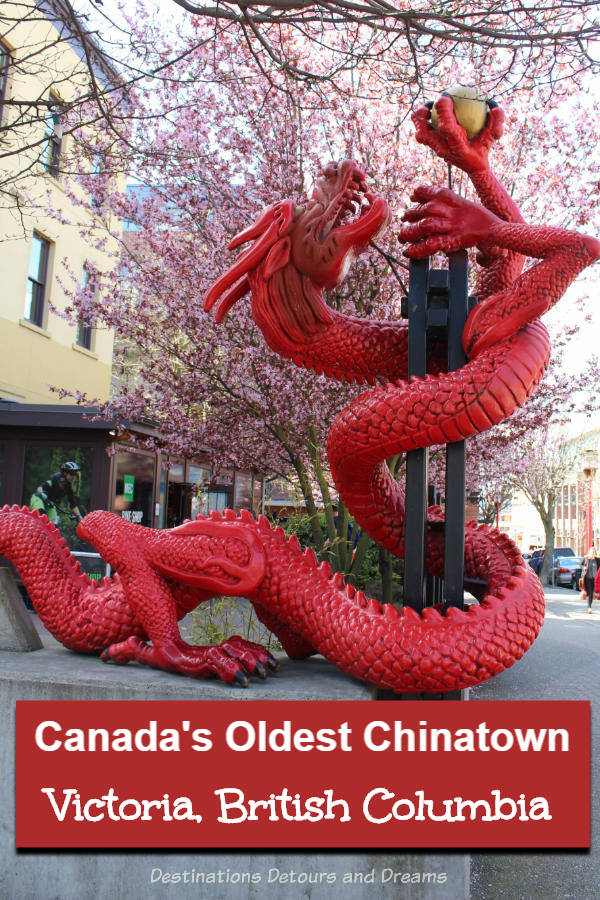

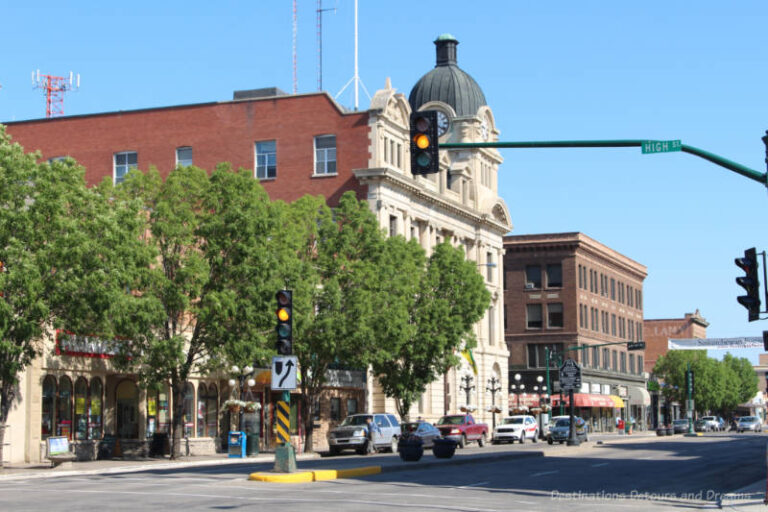
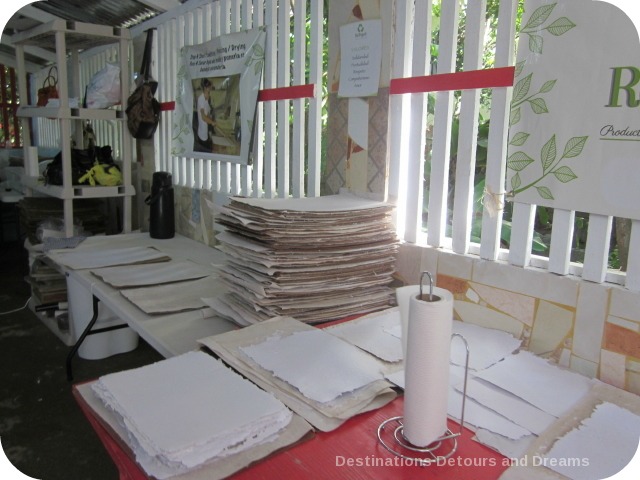

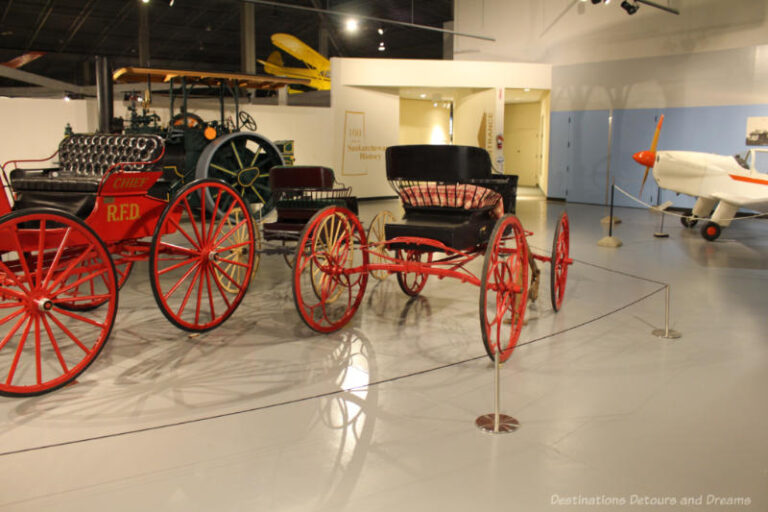
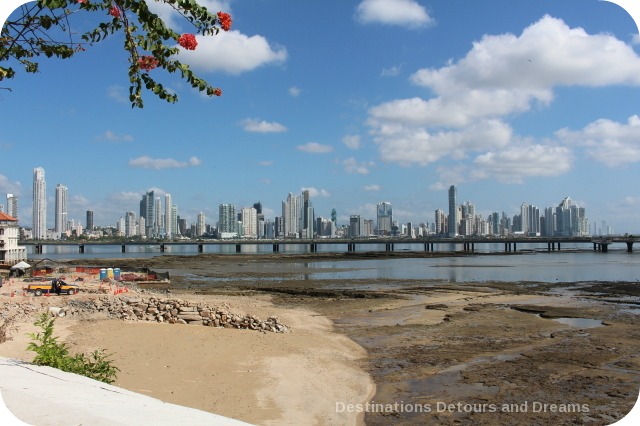
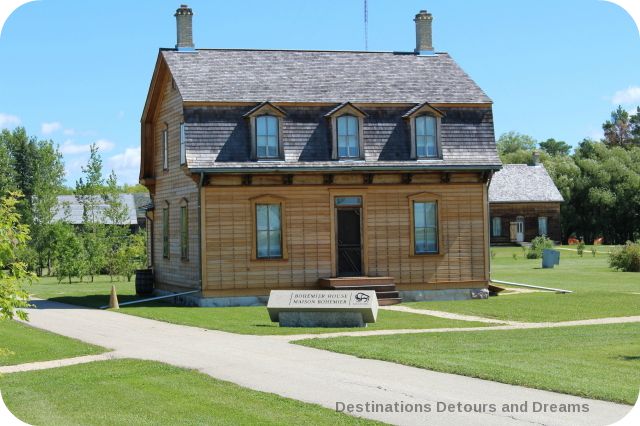
Such a fascinating history of the Chinese migration to Canada as well as a story of the impact they had on Canada’s growth. Sounds like they played an important part in building the Canadian railway, seeking their fortunes during the gold rush and providing goods and services. I love the red brick pattern of the “shou” and the colorful lanterns.
Anita, the history of the early Chinese migration to Canada is not an easy one. The Chinese provided most of the labour to build the railway. Work was hard and wages not great. A prohibitive head tax restricted immigration from 1885 to 1923, which resulted in many men coming without their families. And they faced some discrimination. Later whole families immigrated. Today, they are one of the largest ethnic groups in Canada and many cities have thriving Chinese culture centres.
I love the picture of the entrance to Fan Tan Alley. You’ve really caputred its narrowness and the image fits the description so well. Despite the age of the place it seems to be meticulously maintained.
Ken, all of Victoria’s Chinatown seems to be well maintained.
OK, seeing that I’m Chinese, I think this self-guided tour would be perfect for me to do the next time I am in Victoria.
Jan, I’m sure you’d enjoy it.
Hi Donna,
Thanks for the visit through Victoria’s Chinatown — and your great photos.
~Josie
Thanks Josie.
I really need to visit Victoria one of these days, and this post about their Chinatown area helps seal the deal so to speak.
Jeri, maybe a trip as a treat to yourself when get through your current treatments and beat this cancer thing!
I’ve heard such wonderful things about Victoria’s Chinatown, but unfortunately never got there when I was visiting. Hope to be back this summer and your post has made it a must do on my list. So much history!
Alison, it is always great to return someplace and have new things to explore.
How is it that we’ve been to Victoria multiple times and missed Chinatown?! 🙂 I enjoy exploring Chinatown in different cities and I especially eating in Chinatown! Darn, now I want some steamed pork buns, or bbq pork noodle soup. Yum!
Patti, maybe you can get there in your next visit. Now I’m hungry too!
That red dragon sculpture is to die for! I’d go to Chinatown in Victoria, British Columbia just to see that!
Patti, is is a pretty cool sculpture. It took me some time to get a decent photograph. There was always someone in front posing for picture!
Good history and cultural lesson. This looks like an area that I would very much enjoy. I always like to see the elaborate gateways.
RoseMary, I think you would enjoy walking through this area of Victoria.
Before I opened this post, I thought for sure it was going to be about Toronto! Looks like a great place to explore.
Irene, Toronto has an interesting and vibrant Chinatown, but Canada’s oldest Chinatowns are on the west coast.
Though I’ve been to many Chinatowns in my travels, and have been to Victoria several times, I didn’t even know Victoria had a Chinatown! Pleasant news to me. I will definitely visit it the next time I’m there.
Carole, Victoria’s Chinatown is only a few blocks from the downtown area – it can easily be walked to. It\s worth a visit next time you’re in the city.
I wonder if there is any city in the world that doesn’t have a China Town (just kidding!). The one in Victoria looks very much like the one in San Francisco. Not surprising! I actually like visiting the China towns everywhere I can find them. Like you say, they are so colorful and lively, although they smell of fish pretty bad.
Anda, It’s been so many years since I visited San Francisco’s Chinatown my memories are a bit hazy, but it wouldn’t be surprising to find similarities with Victoria. I didn’t notice much of a fishy smell when wandering through Victoria’s Chinatown.
Again, another detailed coverage that presents the unique features, the history, and the impact of a place. Never thought the oldest would be in Victoria. Thought it would be in Vancouver!
Thanks Carol. Victoria was the main port of entry for all of British Columbia until Vancouver became bigger in the late 1890s.
I love historic locations; so interesting. I appreciate you pointing out this treasure in Victoria!
Thanks Marilyn.